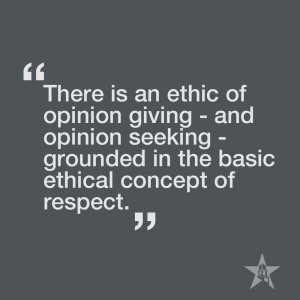Everyone has opinions. I’ve got a lot. Sometimes, being generous, I like to share mine. Sharing apples leaves one with fewer apples; sharing opinions is cost-free. Come by; I’ll share.
It’s nice when you and I have the same opinion. I don’t have to explain myself. Indeed, I don’t have to think at all. We can be at ease, even if wrong!
But sometimes your opinion differs from mine. This can cause difficulties. Not always; some things just don’t matter. And when both of us agree that it doesn’t matter, we are good. Let’s go to lunch.
We sometimes disagree about things that do matter. Or I think they do. Sometimes I choose to keep my opinion to myself. (It’s true!) Disagreements about things that matter can fray relationships. And sometimes the relationship matters more than the differing opinions do. Let’s just not talk about it, ok? We’ll go to lunch, but talk about something else.
There are times when I want to know what your opinion is. I’ll ask. Maybe just hearing your opinion is enough. You said so and you should know.
 But sometimes I need more. I need to know more, to understand more fully. I need to understand why you hold that opinion, what reasons there might be for thinking that what you believe to be the case actually is the case. Maybe I have no opinion myself. Maybe I have a contrary opinion. Maybe I even share yours. Nonetheless, I’m seeking reasons. What do you have to say in favor of your opinion? And if all you can say in favor of your opinion is that it is yours, put it in your autobiography. In the chapter on trivia.
But sometimes I need more. I need to know more, to understand more fully. I need to understand why you hold that opinion, what reasons there might be for thinking that what you believe to be the case actually is the case. Maybe I have no opinion myself. Maybe I have a contrary opinion. Maybe I even share yours. Nonetheless, I’m seeking reasons. What do you have to say in favor of your opinion? And if all you can say in favor of your opinion is that it is yours, put it in your autobiography. In the chapter on trivia.
Giving reasons can be hard, sometimes nearly impossible. But when I ask, please don’t do a power play with me. “Because I said so” is the redoubt of last resort for the insecure (and the route to sanity for parents of toddlers). If that’s all you’ve got, I’ll seek wisdom elsewhere.
I do have a point. There is an ethic of opinion giving—and opinion seeking—grounded in the basic ethical concept of respect.
But first consider three types of relationships, varying in authority and responsibility. There are relationships of equality, those between friends, teammates, spouses or colleagues. There are relationships of significant difference, those between parent and child, coach and team member, professor and student, doctor and patient, plumber and client, or Creator and creature. And there are relationships of contingent difference in which the difference in authority is not grounded in inherent differences between the parties. Consider an R.A. and a student resident. Yes, one has responsibilities the other lacks. And with those come a certain kind of authority. Yet the two roles could easily be reversed. The same holds between committee members and committee chairs, department chairs and department members, team captains and team members, and, often, between employment managers and their subordinates. Even between presidents and senators.
Those on this third list each involve shared tasks, and shared tasks require structure, including some division of labor. Leadership is one—only one—necessary role. Countries, committees, and colleges all require leaders. But these are only roles, contingently held.
 You’re the R.A. because you were selected from among other qualified applicants. You happen to be the department chair, but not because you are smarter or know more than your colleagues. You were chosen to be captain because you are liked and respected, but other team members could do the job just as well.
You’re the R.A. because you were selected from among other qualified applicants. You happen to be the department chair, but not because you are smarter or know more than your colleagues. You were chosen to be captain because you are liked and respected, but other team members could do the job just as well.
Now, my two ethical points about opinions:
First, opinions about things that matter should come with reasons. Not always. Less often in relations of essential difference. Usually in relations of equality. And they are very important, but too frequently avoided, in relations of contingent difference. Give an opinion, often in the form of a chosen course of action, from a position of contingent authority? Be prepared to give reasons. Respect for others involved in the shared task requires it.
And second, those who contingently occupy positions of heightened responsibility should seek the opinions—and accompanying reasons—of others who share the task. Respect—and good decision making—requires it.
